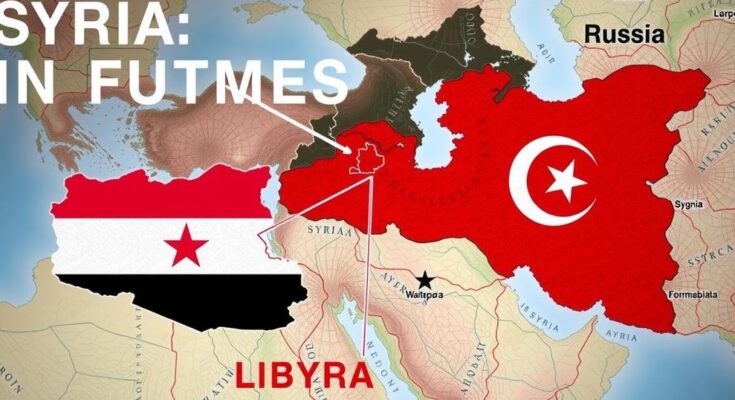Russia’s shift from Syria to Libya reflects a strategic recalibration as Moscow seeks to establish stronger ties with Khalifa Haftar amidst the weakening Assad regime. This transition highlights the vulnerability of authoritarian alliances and the West’s challenges in countering Russian influence, particularly as Haftar’s reliance on Moscow deepens. The article advocates for the West to prioritize structural stability in Libya rather than merely attempting to peel away strategic partners from Russian control.
In light of the recent upheaval in Syria, Russia is redirecting its focus towards Libya, presenting a complex challenge for Western powers. The fall of Damascus signifies a weakening of alliances forged by coercion, as Bashar al-Assad’s government struggles against internal dissent. This crisis has prompted Moscow to adapt, relocating military assets to Libya where it seeks to establish a stronger foothold, particularly through its support of Khalifa Haftar and the Libyan National Army (LNA). Russia’s evolving strategy reflects a historical ambition for Mediterranean influence dating back to the 18th century, emphasizing continuity in its foreign policy rather than merely replacing proxies. Haftar, like Assad, embodies the risks inherent in Russia’s transactional alliances, relying heavily on Moscow for military and logistical support while simultaneously revealing vulnerability due to this dependence.
The West’s failure to engage effectively in Libya during its transitional period allowed for Russia’s intervention. Attempts by the United States to disentangle Haftar from Russian influence overlook his deep ties to Moscow, cemented by military reliance on Wagner Group mercenaries and Russian resources. The relationship, characterized by mutual benefit rather than loyalty, poses challenges for the West, which often misjudges Haftar’s autonomy. Russia has adeptly exploited Libya’s fractured political landscape, positioning itself as a key player through Haftar’s leadership.
The current dynamics involve Haftar’s consolidation of power, akin to Assad’s regime, while simultaneously increasing Moscow’s influence over Libya’s political future through economic ties, particularly within the National Oil Corporation. Optimistically, Western engagements have aimed to create stability in Libya through shared economic benefits, but these efforts have resulted in increased corruption and dependency on external actors.
To counteract this trend, the West must recognize the limits of its influence on the ground and refrain from assuming that leaders like Haftar can be shifted from under Moscow’s control. Strategic engagement should prioritize the strengthening of Libya’s governance and economic structures to mitigate the exploitation by external forces. Ultimately, for the West to avoid historical mistakes in Syria and Libya, a more proactive and coherent strategy is essential, as neglecting early intervention leads to repeated failures.
Emadeddin Badi, as a nonresident senior fellow with the Atlantic Council, emphasizes the necessity of understanding and addressing the complexity of relationships in conflict regions.
The shifting dynamics in the Mediterranean, particularly as Russia pivots from Syria to Libya, underscore the importance of understanding the nuanced geopolitical landscape. Russia’s military presence in Syria, initially thought to bolster its regional power, has shown vulnerability as Assad’s regime falters. Consequently, Moscow’s focus has shifted toward Libya, where it seeks to exploit existing conflicts and build alliances, particularly through its collaboration with Khalifa Haftar, who serves as a prominent figure in the Libyan National Army. This backdrop illustrates the precarious nature of proxy alliances and the need for Western powers to reassess their strategies in regions heavily influenced by external actors like Russia.
The article underscores the shifting geopolitical dynamics as Russia transitions its focus from Syria to Libya, highlighting the inherent vulnerabilities within its alliances with authoritarian figures. The West’s strategy in these regions has been reactive rather than proactive, often misjudging the implications of its engagement with leaders like Haftar, who exhibit deep military dependency on Moscow. For sustainable stability in Libya, the West must prioritize strengthening local governance and addressing economic vulnerabilities to counter foreign exploitation effectively. Only through decisive action and an understanding of the historical context can the West avoid repeating past mistakes that enabled Russia’s strategic foothold in various conflict zones.
Original Source: www.atlanticcouncil.org




